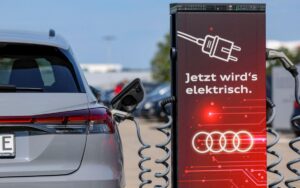The electric vehicle (EV) market in Europe is facing some significant challenges, with Germany experiencing a sharp drop in sales of battery-powered cars. According to the European Automobile Manufacturers’ Association (ACEA), sales of new EVs in Germany plummeted by nearly 70% in August, while in France, deliveries fell by 33%.
This decline in EV sales has raised concerns about factors such as range anxiety, high prices, and inadequate charging infrastructure across the EU. Felipe Munoz, a global automotive analyst at JATO Dynamics, noted that electric vehicles are still not convincing consumers, whether they are individuals or businesses.
One of the factors contributing to Germany’s EV sales slump is economic uncertainty, compounded by the EU’s tariffs on Chinese-made electric cars, which have led to higher prices in the more affordable end of the market. Volkswagen, one of Germany’s largest carmakers, has even warned of potential factory closures due to slumping sales.
The ACEA has called for urgent action to address new EU net zero car sales rules, which could subject European EV manufacturers to hefty fines for exceeding carbon emissions limits. The European Commission is set to introduce new rules that will require all new European cars to produce no more than 93.6g of CO2 per kilometre, with fines for non-compliance.
Despite efforts to promote EV adoption, the ACEA pointed out that demand for electric vehicles still lags behind the levels needed to meet the EU’s emissions targets effectively. The industry body highlighted the need for infrastructure development, competitive manufacturing environments, incentives, and a secure supply of raw materials to support the growth of the EV market.
Top carmakers like Volkswagen, BMW, and Renault have suggested pushing back the targets for reducing carbon emissions to avoid fines. Meanwhile, Italy has raised concerns about the EU’s plans to ban petrol cars by 2035, warning that such a policy could have negative consequences for the automotive industry.
As the EV market faces challenges and regulatory changes, it is essential for stakeholders to address the barriers to adoption and work towards a sustainable future for electric vehicles in Europe. Stay informed and broaden your horizons with the latest news and analysis from Extreme Investor Network.

